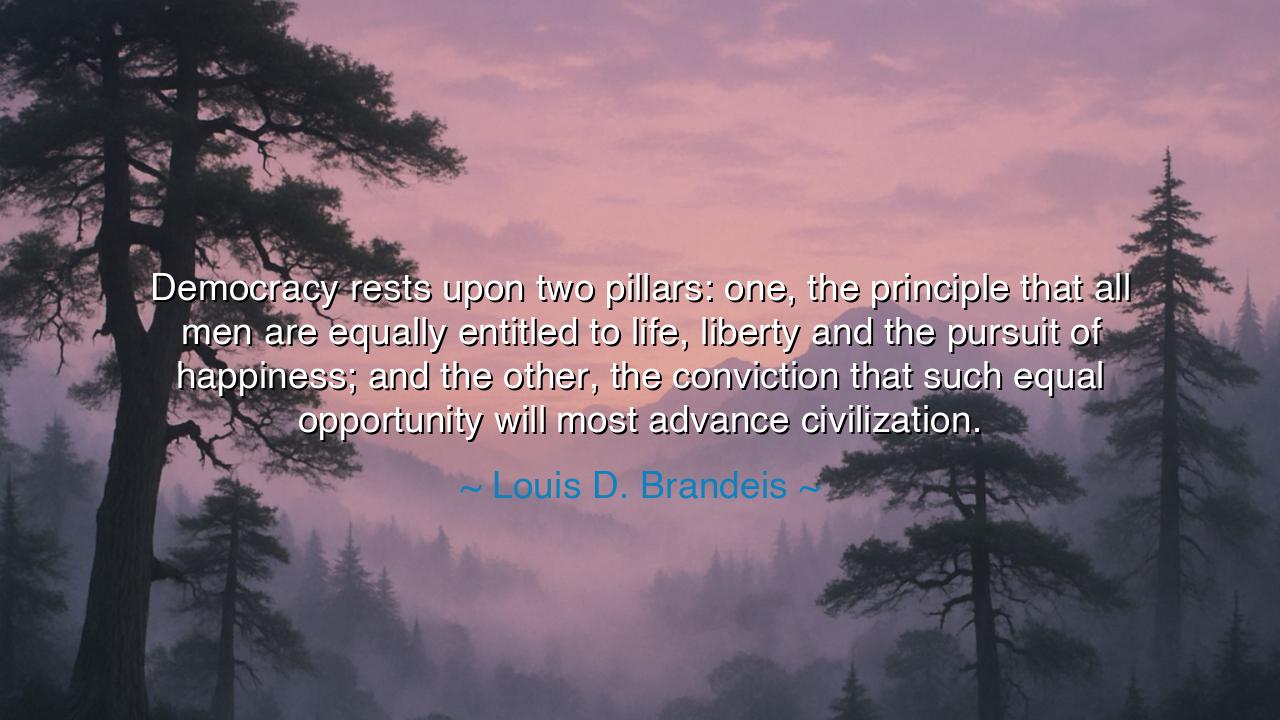
Democracy rests upon two pillars: one, the principle that all men
Democracy rests upon two pillars: one, the principle that all men are equally entitled to life, liberty and the pursuit of happiness; and the other, the conviction that such equal opportunity will most advance civilization.






In the words of Louis D. Brandeis, “Democracy rests upon two pillars: one, the principle that all men are equally entitled to life, liberty and the pursuit of happiness; and the other, the conviction that such equal opportunity will most advance civilization,” we find not the dry language of law, but the heartbeat of a moral vision. Brandeis, who rose from humble beginnings to become one of the most revered Justices of the United States Supreme Court, speaks here as both jurist and philosopher. His words form a bridge between ideal and duty — between what democracy promises and what it must protect. For democracy, he reminds us, is not merely a system of votes or laws, but a sacred covenant built on two living pillars: equality and opportunity.
The origin of this quote lies in Brandeis’s lifelong devotion to justice and civic integrity. Born to immigrant parents in 1856, he rose to prominence not by inheritance, but through the force of his intellect and moral conviction. As a lawyer and later as a Supreme Court Justice, he championed the rights of workers, women, and consumers against the tyranny of unchecked corporate power. To him, democracy was not a static structure of governance — it was a living organism, one that thrived only when nourished by fairness and human dignity. The first pillar, equal entitlement to life, liberty, and the pursuit of happiness, he drew from Jefferson’s immortal words; the second pillar, the belief that such equality fosters the progress of civilization, he carved from his own experience in the struggle for social justice.
To Brandeis, these two pillars stood in sacred balance. The first, equality, is the foundation of human worth: no man born above another, no destiny decided by birth, wealth, or creed. The second, opportunity, is the movement of that equality into action — the chance for each individual to labor, to learn, to create, to rise. Without equality, opportunity becomes privilege; without opportunity, equality becomes an empty promise. Only when both are held together, as twin lights guiding the path of a people, can civilization advance not merely in power, but in virtue.
History is filled with the consequences of neglecting either pillar. In ancient Athens, the first democracy, liberty was celebrated but unevenly granted; slaves and women stood outside its circle of rights. In contrast, the Roman Republic, with its rigid hierarchy, lost its spirit of opportunity and collapsed beneath its own corruption. Centuries later, in modern times, the same lesson repeated itself in revolutions and reformations across nations — proving that democracy, to endure, must forever strive to widen its circle of justice. Each generation must renew the vow: that freedom belongs to all, and that opportunity must not be hoarded by the few.
Consider, for example, the struggles of Abraham Lincoln, who carried these same truths into the furnace of civil war. In freeing the enslaved, Lincoln acted not only out of compassion but from conviction that no democracy could survive built upon the suffering of others. His vision of “a new birth of freedom” echoed Brandeis’s pillars: the right of every person to live in liberty, and the belief that civilization rises higher when each soul is allowed to contribute to it. The blood that sanctified Gettysburg watered the roots of that same truth — that progress without equality is tyranny disguised as triumph.
Brandeis also warned that the enemies of democracy are not always foreign conquerors but indifference and inequality within. When wealth silences the poor, when privilege decides the fate of the many, when cynicism replaces conviction, the pillars crack. Yet, he believed in the power of moral courage — of citizens who, through integrity and participation, could renew the nation’s strength. For him, the highest form of patriotism was not blind allegiance but responsible engagement — the willingness to uphold both pillars with one’s words, labor, and conscience.
Thus, the lesson of Brandeis’s words is clear: democracy is not self-sustaining. It requires guardians — ordinary people who choose fairness over convenience, truth over comfort, justice over advantage. If you wish to serve your community or your nation, begin not with power, but with principle. Defend the equality of every soul, and work to ensure that opportunity is open to all — not just in word, but in deed. These are not abstract virtues, but daily duties.
So remember, O seeker of freedom: the strength of a people lies not in armies or wealth, but in the steadfastness of their moral foundations. Equality gives democracy its heart, opportunity gives it its motion, and together they form its destiny. When either is forgotten, liberty falters; when both are honored, civilization ascends. Uphold them, and you uphold the future.






AAdministratorAdministrator
Welcome, honored guests. Please leave a comment, we will respond soon